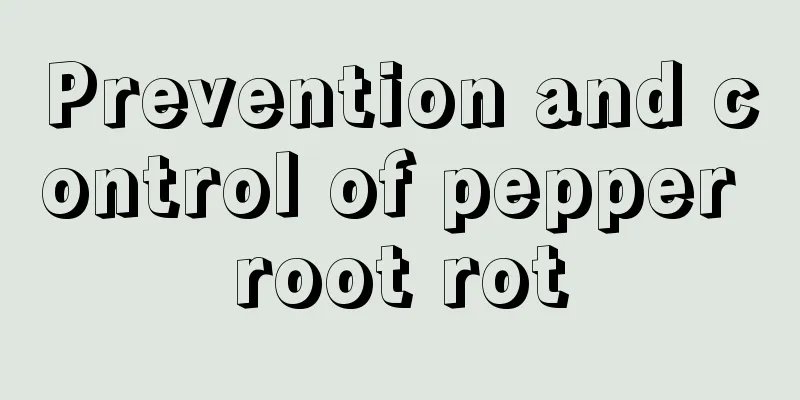Prevention and control of pepper root rot

|
In the process of growing peppers, pepper root rot is a hazard that needs to be focused on prevention and control. In seasons with abundant rainfall, severe disease of peppers can cause root rot, gradually leading to the death of the pepper plants. A large-scale outbreak will cause great losses to growers. Preventing and controlling pepper root rot is an important part of ensuring the healthy growth of pepper plants. So, how to prevent pepper root rot? 1. Characteristics of damage : Pepper root rot generally occurs from the time peppers are planted in greenhouses to the peak harvest period. The initial symptoms are wilting of one plant or several branches of a plant, which eventually leads to the death of the entire plant and all the peppers. The harmful pathogen can survive in the soil for 5-10 years, spreading through rain, irrigation and diseased and damaged plants. High temperature, high humidity, continuously cropped land, clay soil and low-lying land are all conducive to its occurrence. 2. Five steps to prevention and treatment 1. Crop rotation. Due to the long survival time of pathogenic bacteria in the soil, crop rotation with crops such as cabbage, kale, garlic, and onion for more than 5 years is an important cultivation condition to reduce or eliminate the occurrence of pepper root rot. 2. Eliminate the source of initial infection. To solve the problem of seedling cultivation of peppers in greenhouses, generally, the pepper seedlings have to be solved by oneself. If there is a special situation and you need to buy seedlings, you must never buy them in the diseased area, so as to effectively prevent the spread of pepper root rot caused by the purchase of seedlings. 3. Scientific management to prevent water accumulation. When preparing the land, a drainage ditch should be dug at one end; use ridge planting with a ridge spacing of 90 cm and plant two rows on one ridge, which is beneficial for early ridge closing, ventilation, lighting and field management; use fully decomposed organic fertilizer or 500 times diluted "5406" No. 3 bacterial powder; for topdressing in the middle and late stages, use the prepared compound fertilizer mother liquor to apply when watering, or spread it along the ridges and then water, to prevent damage to the pepper roots due to human management. 4. Isolation of diseased fields. If you find one or several pepper plants in the pepper field wilting at noon and recovering slightly at night, you should pull them out immediately, take them out of the field and burn them, then bury the area around the pepper plants with soil mixed with lime, and then seal the entire field. 5. Irrigate the roots with medicine. After transplanting and the seedlings have grown, use 800 times diluted Xiangnong No. 4 wettable powder and 600 times diluted 40% polysulfide suspension before the disease occurs, and mix with a strong rooting agent, and irrigate the roots of each pepper plant every 7-10 days, for 3-4 times in a row. |
<<: Why is the car exhaust pipe noisy?
>>: How long does it take for the spiciness of peppers to go away?
Recommend
Special TCM treatments to improve sleep in patients with brain cancer
Brain cancer is a common tumor of the nervous sys...
How long is the life expectancy of early stage nasopharyngeal cancer and can it be cured?
In daily life, there are many accidents, which ma...
What to do if the water from the buttocks has a strange smell
If the discharge from the buttocks has an odor, y...
The efficacy and function of mugwort pillow
Pillows are our common bedding. With the improvem...
Liquid foundation suitable for oily skin with acne marks
Everyone should be familiar with oily skin, which...
How to properly care for lung cancer patients? Main considerations for lung cancer care
If there is a lung cancer patient in the family, ...
What are the characteristics of floating pulse?
In ancient times, because medicine was not well d...
How to wash leather clothes? Do you know how to clean leather clothes without causing damage?
How to wash leather jackets after wearing them fo...
Will cheilitis heal on its own?
The skin tissue of the lips is relatively weak, a...
Can narrow double eyelids be made wider?
In life, everyone has different requirements for ...
How is breast cancer detected?
In recent years, breast cancer has gradually rise...
What is lactic acidosis?
Lactic acidosis is extremely harmful. A small num...
Can I eat before fibroid surgery
Before fibroid surgery, patients usually need to ...
What is the correct way to educate children?
In order to educate their children, parents will ...
Hepatic coma due to advanced liver cancer
Hepatic coma in late stage of liver cancer 1. Lat...









